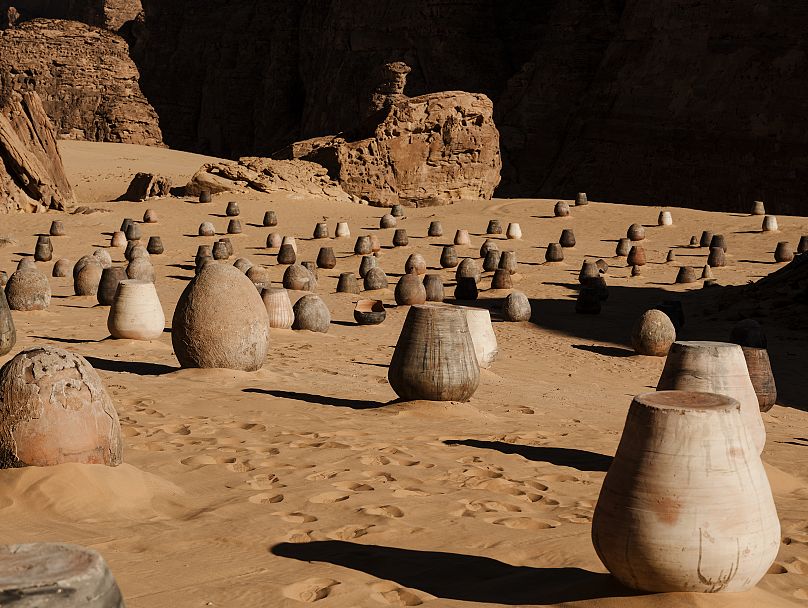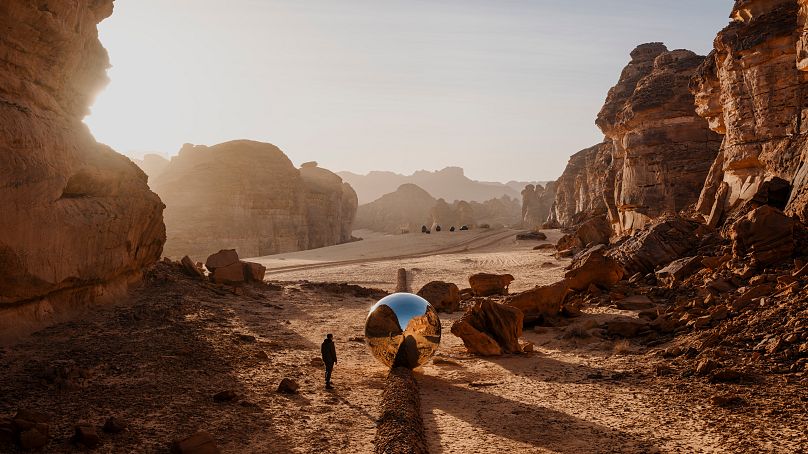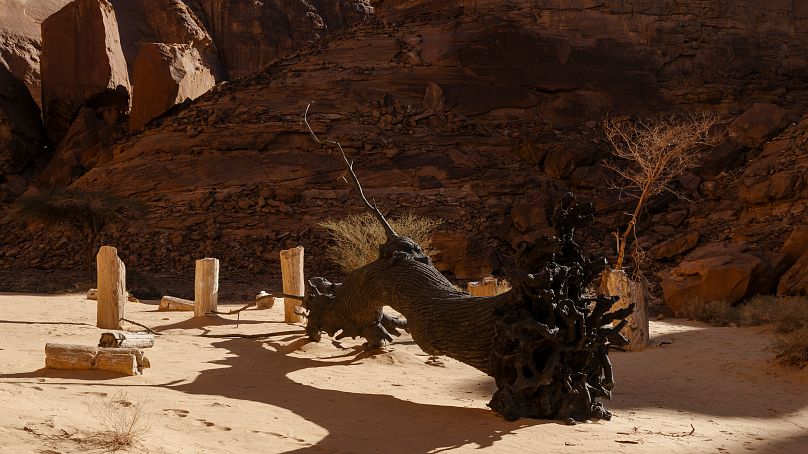Desert X curator Neville Wakefield has been involved since the start shaping its journey from the Coachella Valley to Saudi Arabia. This year he returns to AlUla as the arts festival's co-artistic director and believes it can be a catalyst for change in the region.
Amid the desert of northwestern Saudi Arabia, a huge mirrored sphere reflects the surrounding lunar landscape, hundreds of terracotta pots dot the sand, and the scent of frankincense and myrrh hangs between the canyons.
These are artworks, part of the third edition of Desert X AlUla. Set in a region with a deep legacy of cross-cultural exchange and home to the country’s first UNESCO World Heritage Site (Hegra), this site-responsive exhibition by California’s Desert X and the Royal Commission for AlUla, in turn, seeks to foster cultural dialogue through art.
The open-air show, which sees 16 contemporary works by both Saudi and international artists find their home in the majestic desert landscape, forms part of the wider AlUla Arts Festival: a wide-reaching celebration of the arts, including exhibitions by Saudi artist Manal Al Dowayan (who will represent Saudi Arabia at the Venice Biennale this year), photography by legendary Moroccan artist Hassan Hajjaj, art and design residencies, and unveiling the winner of the Ithra Art Prize.
British curator Neville Wakefield has been with Desert X since the beginning, shaping its journey from the Coachella Valley to Saudi Arabia and returning this year to AlUla as co-artistic director, together with Raneem Farsi. Euronews Culture spoke with Wakefield about what makes Desert X AlUla special, challenging, and a catalyst for progress in the region.
How did you come to be involved with Desert X AlUla? What drew you to the project?
Neville Wakefield: It started in California, with Desert X there. I've been with it from the beginning, so I'm the founding artistic director. I'm interested in how taking art outside of institutional walls gives the opportunity to engage new audiences, and DesertX has been about really lowering the threshold of entry.
With a museum or an institution, you have an architectural barrier, an economic barrier and often a social barrier. You also sort of have an ontological barrier too, in terms of seeing objects that have been extracted from their context and put in this “white cube”. If you don't know about the history of the object, it doesn't mean very much. In contrast, everyone has some kind of relationship to landscape, primal or mediated. Really the landscape is the curator. Lowering that barrier – I really loved that idea.
With that in mind, what kind of responses have you had from people?
Both here and in California, a lot of our audience are people who would never go to a museum – this is their introduction to art. The most rewarding thing about a show like this is when you have someone have a revelation that this is not a conversation that's being had in a space that they have no relationship to and that they're not interested in; it’s something that they own. I think all of this art in some way, is conversation, and how it kind of ripples out is very important.
The community aspect is really important. It's particularly interesting here because it's in its infancy. A lot of people haven't had much exposure to art – you know, there aren't many art schools in Saudi yet, so most of the art, or most of the art education, comes from outside. I think that's changing. Many of the works have amazing community programmes around them, like there's a fantastic set of children's books going into local schools, which are all about the show. And then we've got the volunteers. All the volunteers are local community members, and some of the works have been created with the help of local people.
Tell us a little about the theme of this year’s Desert X AlUla, “In the Presence of Absence”?
Well, I think there's a popular misconception that desert is this empty place – it's a blank canvas upon which you can, as an artist, project your identity. The longer you spend in deserts, the more one becomes aware of how full of life they are, albeit often invisible in its form. I think many of the works reflected that; we were interested in exploring the side of the desert that is less visible. I think one of the things that artists do very well is that they allow one to see things through different eyes, and those eyes can also expose the things that we don't really see.
Did anything surprise you about how artists engaged with the landscape, and were there any particular challenges that came up when working on this edition?
There are always surprises! It can be daunting, and one of the things I think that's interesting about exploring the less visible side of it is that you're not necessarily having to engage with the majesty of the landscape – rather you’re looking beneath it and around it. You’re looking at its histories, the stories that underwrite it, the scents that have blown in the wind, this kind of “shadow biosphere” and the less visible things. There's a durational aspect, and there's a conversation with time. You feel it when you're here: there's geological time and there's biological time, and these are two very different registers. Giuseppe Penone's piece is a perfect example of that – it has all these registers of time, from petrified and dead wood, to bronze wood, and the living tree behind it.
There are always challenges, but the challenges become virtues. You're working in an uncontrolled environment. In an institution, everything's controlled: climate control, lighting. Sitting here, we’re covered in dust! Pieces here can literally sink into the sand.
Fostering conversation between international and local artists, and between the Saudi arts scene and the world, was an aim that founder Susan Davis set out for Desert X. Do you think it's been successful in that regard?
I do! These shows are structured as dialogues. They’re dialogues between the place, between artists, and between cultures. Each of the Desert Xs here are dialogues on three levels: Saudi, the MENA region, and internationally, for want of a better word. I do think that we’re a really important part of the conversation, especially in a country where there hasn't been much opportunity to show work until very recently. What we are doing here would not have been conceivable even ten years ago.
What role do you see Desert X as playing within the wider art scene in Saudi?
I think it's modelling a lot of things. It's really interesting that here, for a lot of Saudis, this kind of outdoor art in the landscape is their first exposure to contemporary art. This is kind of a reversal of what happened in the West, where most art was contained, was institutional, and then broke out. So, now the process is inverted. I think this whole model that we've developed with Desert X for art in the landscape has become to some extent the envy of museums. Visitor numbers are growing, which is testament to how it works in terms of gaining new audiences.
Desert X AlUla 2024 runs until 23 March. It is curated by Maya El Khalil and Marcello Dantas.














